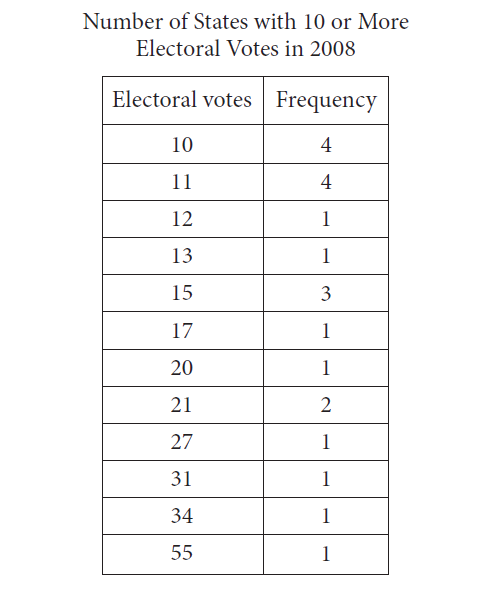
In 2008, there were 21 states with 10 or more electoral votes, as shown in the table above. Based on the table, what was the median number of electoral votes for the 21 states?
13
15
17
20
The correct Answer is:B
The median of a list of numbers is the middle value when the numbers are listed in order from least to greatest. For the electoral votes shown in the table, their frequency should also be taken into account. Since there are 21 states represented in the table, the middle number will be the eleventh number in the ordered list. Counting the frequencies from the top of the table (4 + 4 + 1 + 1 + 3 = 13) shows that the median number of electoral votes for the 21 states is 15.
Choice A is incorrect. If the electoral votes are ordered from least to greatest taking into account the frequency, 13 will be in the tenth position, not the middle. Choice C is incorrect because 17 is in the fourteenth position, not in the middle, of the ordered list. D is incorrect because 20 is in the fifteenth position, not in the middle, of the ordered list.
Similar Questions
743 children from the United States, aged 6 through 11, were tested to see if they were overweight . The data are shown in the table below.

Based on the data, how many times more likely is it for a 6, 7, or 8 - year - old to NOT be overweight than it is for a 9, 10, or 11 - year - old to NOT be overweight? (Round the answer to the nearest tenth.)View Solution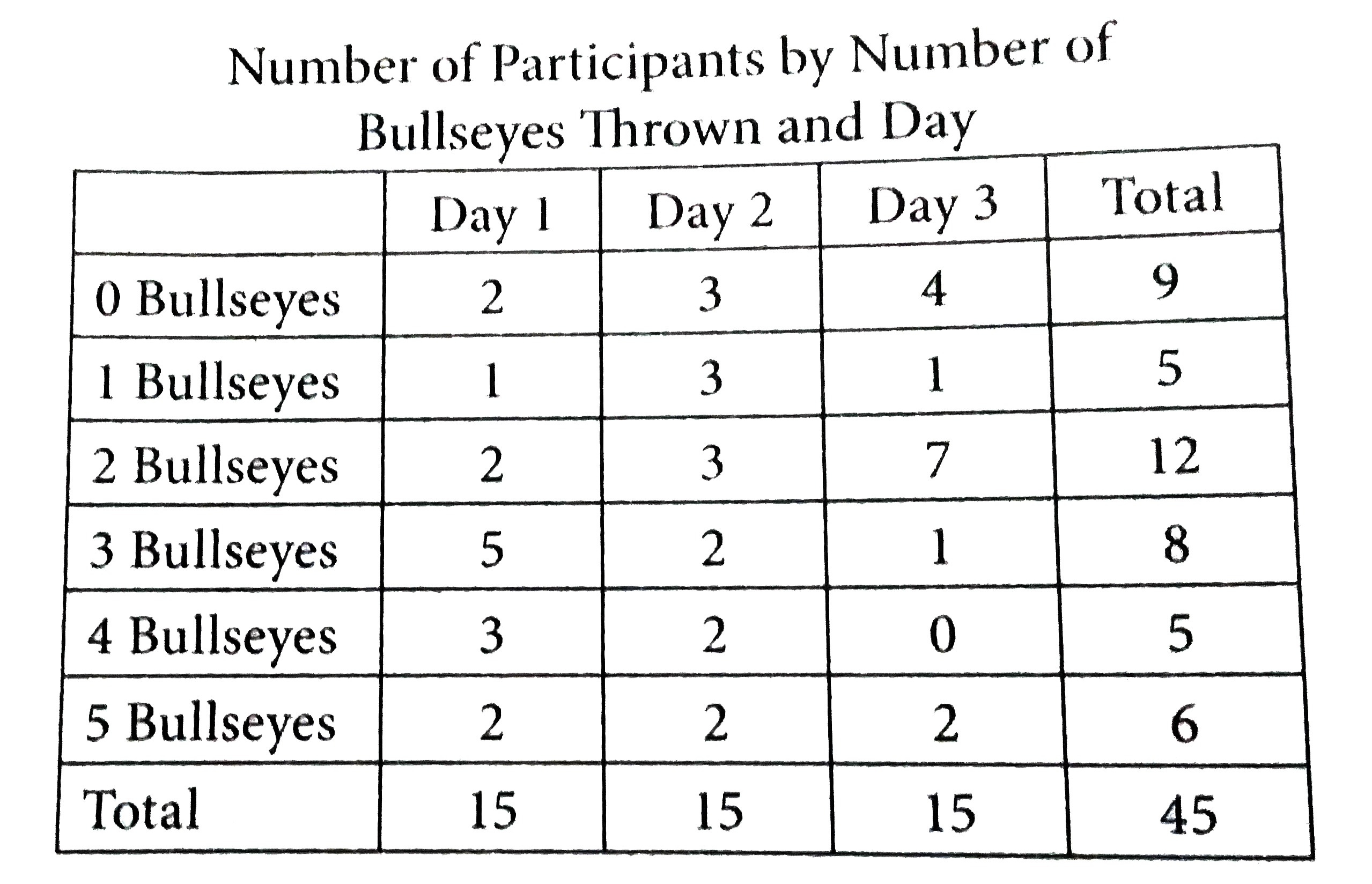
The same 15 participants, on each of 3 days, threw 5 darts in order to win a bullseye contest. The number of players throwing a given number of bullseyes on each day is shown in the table above.
What is the mean number of bullseyes each participant threw on DAY 2?View Solution
Knowledge Check
- Question 1 - Select One
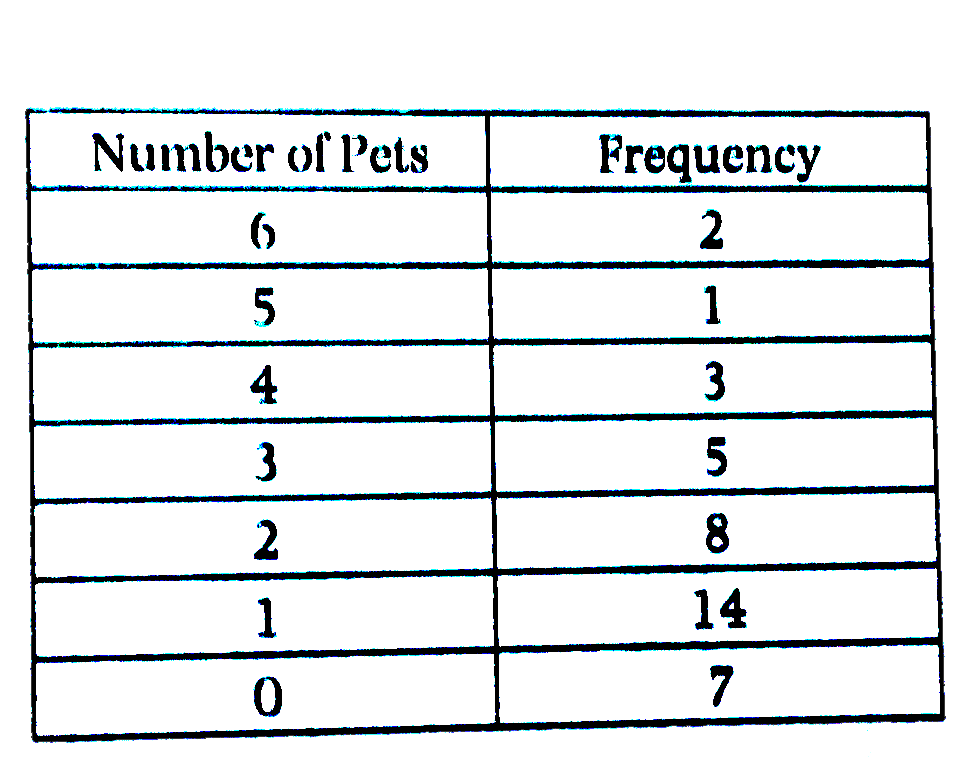
The number of pets owned by children in a sixth grade class are shown in the table above . What is the median of the data ?A1B2C3D5 - Question 2 - Select One
744 children from the United States, aged 6 through 11, were tested to see if they were overweight . The data are shown in the table below.
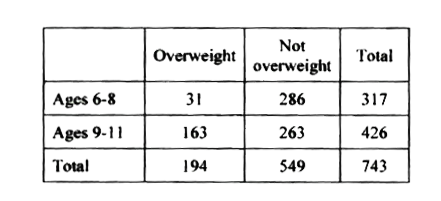
∗ According to the table, which of the following statements is most likely to be true about children between 6 and 11 years old, inclusive, in the United States ?AThe probability that a 6-8 year old is overweight is greater than the probability that an overweight child aged 6-11 is less than 9 years old.BThe probability that a 6-11 year old is overweight is greater than the probability that a 9-11 year old is not overweight.CThe probability that an overweight 6-11 year old is at least 9 years old is greater than the probability that a 6-11 year old is not overweight.DThe probability that a 6-8 year old is overweight is greater than the probability that a 9-11 year old is not overweight. - Question 3 - Select One
Passage 1 The electrol collage has received much attention lately, primary for being antiquated and absurd. However, I would argue that it's actuallly much more absurd than most realize. History class provides us with a rather fragmented understanding of the electrol college. We teach in schools that a presidental candidate must recieve an absolute majority of the electrol college votes to win the president election, but party's electors are chosen in a variety of ways, but they're typically reputable memebers of the party. When a citizen casts a vote during the presidental election,he or she is actually voting for a particular party's electors to cst their votes for the presidental candidate to whom they have pledged. What we certainly don't teach in schools is that these electors in many states aren't even legally obligated to actually choose the candidate with whom they're allied! As of 2000, there were 24 states without laws preventing this,for a total f a possible 257 rogue votes. It fact, there have been a minimum of 157 cases of such "faithless voting". Until 2008, Minnesota's electors voted anonymously, thus the number of faithless voting is almost certainly higher. Even in the states where there are penalties for faithless voting,the penalties tend to be minimal and aren't typically enforced. Thus,the only things keeping electors honest are the honor code and the desire to stay reputable members of their parties. Aside from faithless voting,there also been cases where the electors died in between being choosen as electors and causing their votes. Obviously, this isn't a frequeent occurerance, but still a problem that we wouldn't have to contend with in a popular votes system. It's hard to understand why we maintain a system with so many glaring problems and very few redeeming qualities. Many cite tradition and the insight of our foretheres as reasons for preventing the electrol college, but the electrol college isn't even inact in its original form,since the second place candidate no longer as vice presindent. It's way past time we cut or looses and admit that we've been defending a ridiculous arrangement for decades. If we weren't ashamed of it,maybe we'd actually be teaching its intricacies in school. Passage 2 The iron fabric of Classic american Essence had a good run. It weathered its way through the centuries,bending with the ebb of turmoil and strectching with the flow of time that brought us to this point. But, the infrastructure was never meant to be permanent slution, it was a stopage , a framework to be patched up and down and remolded as the coutry and its people grew. Somewhere along the line, through, we turned our attention to other matters, and we forgot that basic permises of oxidation: even iron, you see, corrodes. Washington,Franklin,Jefferson, Adams:great men,one and all. Yet, only menflwaed and misinformed,limited by the prevaise misconceptions of the era and hamstrung by the absence of electricity,Internet,REd bull and fish oil. Nonetheless,with each monument built and mountain face carved,eith each minted and dollar bill printed,we came to see them less as mortals than demigods,until we came to the point of no return when our forefathers became Our Forefathers. NOw, seemingly every political debate hinges on the inflliblity of these farmers, and progress is often thwarted by the unimaginative but omniponted for-word bojection-"but the Constitution says..." as if anything written by quill and vellum inside lead-painted walls could ever be indisputable in its absolute certainly. MOre than 200 years of complacency have left us with something resembling less a federal government than a yard sale antiquated institutions,with none more dusty than te clectrol college. Consider than it's theoretically possible to recieved just 11 votes,have your opponent recieve 200 million, and still win the election under the electrol college. Such is the nature of the "winner take all" system in which winning the 11 most populars states by as little as one vote is enough to overcome landslide defeats in the other 39 states and the District of Columbia. Whatever its initial purpose may have been,perhaps it's time to eschew the esoteric in favor of simple arithmetic. Let us turn our attention to progress,lest our fervent insistance on tradition leave us obsolete.
Q. Which statements from Passage 2 is most consistant with the style of arguement primarily made Passage 1?ALines 36-38 ("Somewhere…corrodes")BLines 41-44 ("Nonetheless…Forefathers")CLines 46-47 ("Anything…certainly")DLines 51-53 ("Consider…College")
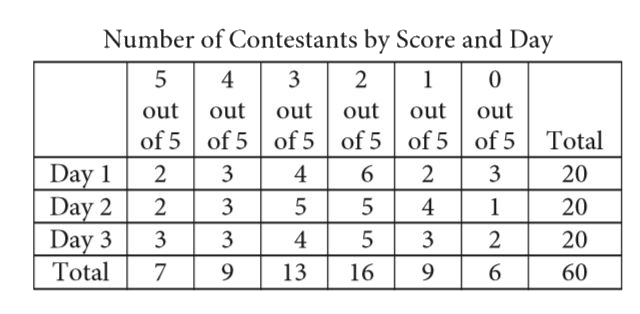
The same 20 contestants, on each of 3 days, answered 5 questions in order to win a prize. Each contestant received 1 point for each correct answer. The number of contestants receiving a given score on each day is shown in the table above.
What was the mean score of the contestants on Day 1 ?View SolutionAges of the First 12 United States Presidents at the Beginning of Their Terms in Office
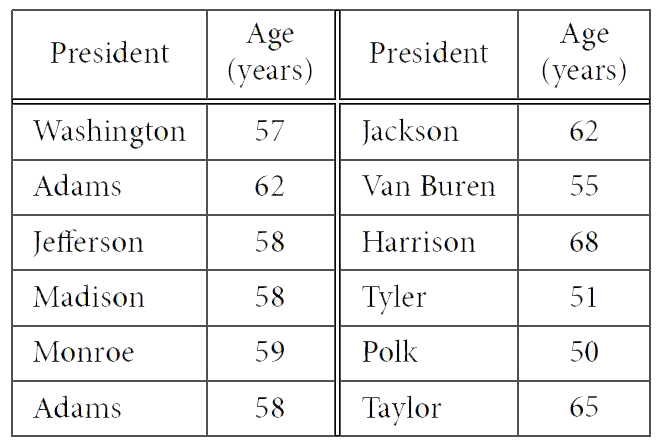
The table above lists the ages of the first 12 United States presidents when they began their terms in office. According to the table, what was the mean age, in years, of these presidents at the beginning of their terms? (Round your answer to the nearest tenth.)View SolutionInternational Tourist Arrivals , in millions
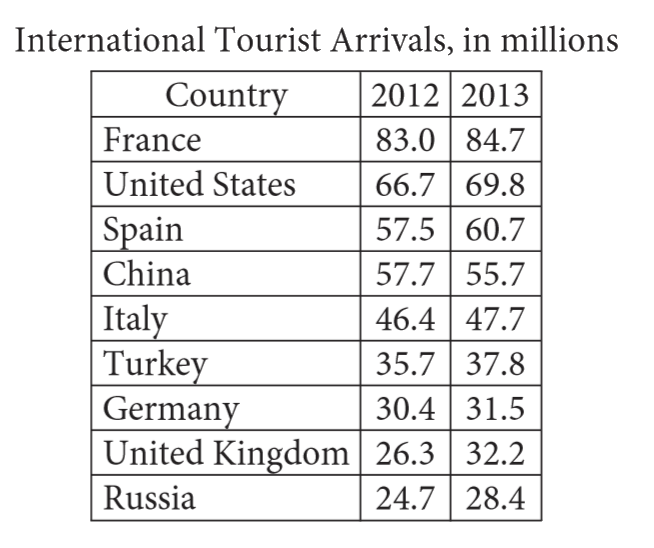
The table above shows the number of international tourist arrivals, rounded to the nearest tenth of a million, to the top nine tourist destinations in both 2012 and 2013 .
Based on the information given in the table , how much greater , in millions, was the median number of international tourist arrivals to the top nine tourist destinations in 2013 than the median number in 2012, to the nearest tenth of a million ?View Solution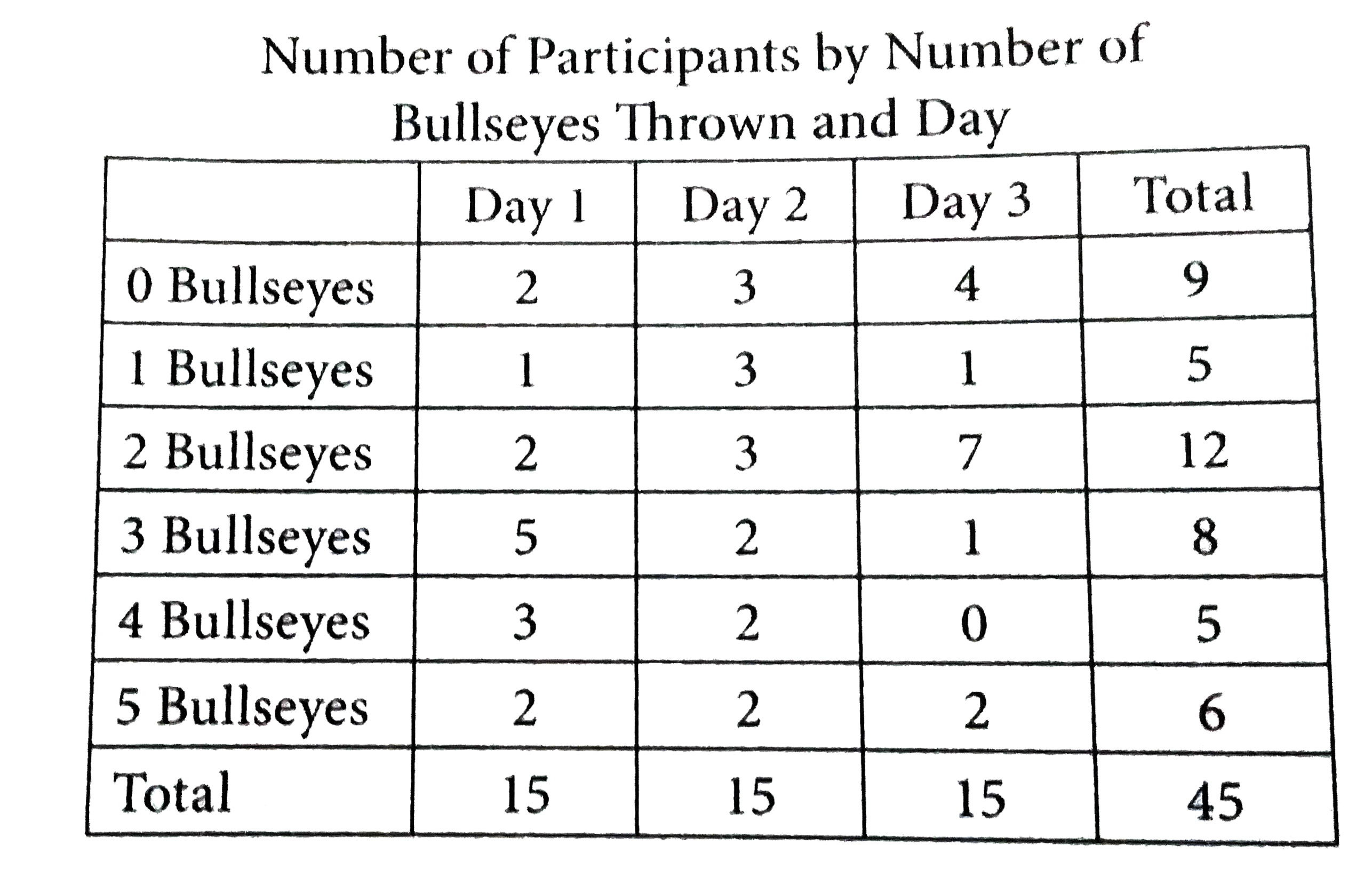
The same 15 participants, on each of 3 days, threw 5 darts in order to win a bullseye contest. The number of players throwing a given number of bullseyes on each day is shown in the table above.
No Participant threw the same number of bullseyes on two different days. IF a participant is selected at random, what is the probability that the selected participant threw 3 bullseyes on Day 1 or DAY2, given that the contestant threw 3 bullseyes on one of the three days?View Solution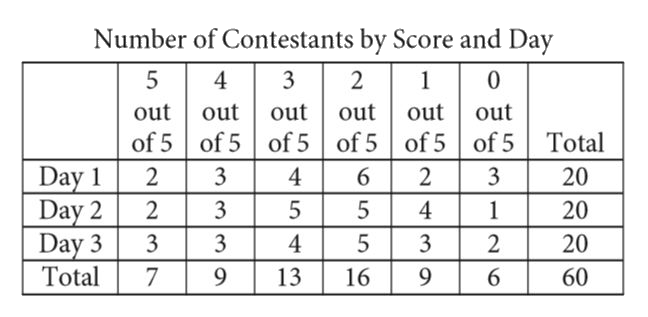
The same 20 contestants, on each of 3 days, answered 5 questions in order to win a prize. Each contestant received 1 point for each correct answer. The number of contestants receiving a given score on each day is shown in the table above.
No contestant received the same score on two different days. If a contestant is selected at random, what is the probability that the selected contestant received a score of 5 on Day 2 or Day 3, given that the contestant received a score of 5 on one of the three days?View Solution

